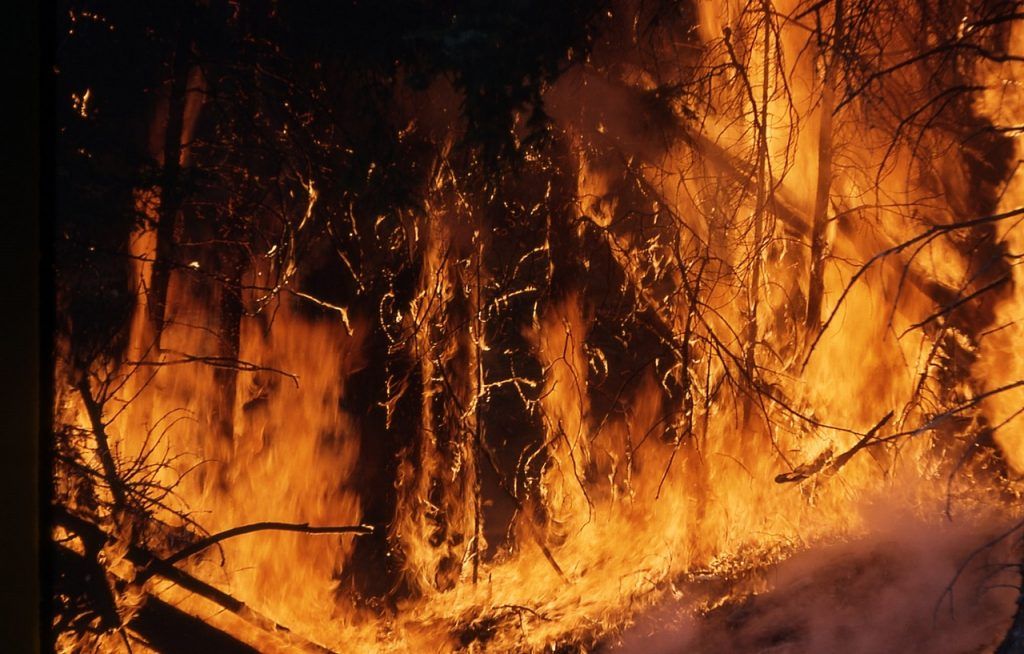Wildfires and climate change
By Richard C. J. Somerville | October 29, 2019
 Image courtesy Pixabay
Image courtesy Pixabay
Some 2,000 years ago, the great Jewish leader Hillel gave a fine example of brevity in teaching. Hillel was confronted by a skeptic who wanted an explanation of the five books of the Torah. The analyses of these books are long. The skeptic, however, demanded a statement so brief that it could be spoken while standing on one foot. Hillel lifted a foot and said: “Treat others as you would wish them to treat you. That is the entire Torah. The rest is commentary. Now go and study.”
The recent terrifying outbreak of fires in California, causing extensive damage and massive evacuations, naturally raises the question of connections between climate change and wildfires. Before we speak about such connections, we should make the effort to learn the basics of the science of climate change. I think any rational response to climate change involves first knowing what the facts and evidence are. That is the province of science. We should all learn and accept the facts and evidence, which are objective truth and should be the same for everyone. Nobody is entitled to his own so-called “facts.”
Fortunately, there is now widespread agreement on the fundamental findings of the science. There will always be outliers in every branch of science, but many studies confirm that about 97 percent of the scientists who have been most active in carrying out research on climate change and publishing it would agree on the basic research results.
The best summary of climate change science is the assessment reports of the Intergovernmental Panel on Climate Change, or IPCC. Five such reports have been published since 1990, and a sixth is due soon. The physical science portion of the most recent IPCC report is scientifically definitive, but it is long—about 1,500 pages full of charts and graphs, and not easy reading.
I am certainly not Hillel, science is obviously not religion, and the IPCC reports are not the Torah. But I think the essence of this IPCC report can be summarized in 12 succinct points. Here they are:
- It’s warming.
- It’s us.
- It hasn’t stopped.
- The heat is mainly in the sea.
- Sea level is rising.
- Ice is shrinking.
- Carbon dioxide makes oceans more acidic.
- Carbon dioxide in the air is up 45 percent since the 1800s.
- It’s now the highest in millions of years.
- Cumulative emissions set the warming.
- Reducing emissions limits the warming.
- Climate change will last for centuries.
Just 12 points. Only 60 words. You can easily speak them while standing on one foot.
One could say much more about each of these twelve points. To start, note these facts:
- It’s warming. It’s not a hoax. We measure it. The atmosphere is warming. So is the ocean. Sea level is rising. Ice sheets and glaciers are shrinking. Rainfall patterns and severe weather events are changing. Climate change is real and serious. It’s not a remote threat for the distant future. It’s here and now.
- It’s us. We’ve done the detective work. It’s not natural like ice ages. It’s human-caused.
- It hasn’t stopped. The warming is continuing. The warmest years on record are recent years.
- The heat is mainly in the sea. Over 90 percent of the heat added to the climate is in the oceans.
- Sea level is rising globally. The rate of this rise is increasing. The rise is not uniform globally.
- Ice is melting. Ice sheets on Greenland and Antarctica, as well as glaciers, are all shrinking.
- Carbon dioxide absorbed by the oceans makes them more acidic. That can affect the marine food chain.
- Carbon dioxide amounts in the atmosphere are about 45 percent higher than in the 1800s, due to human actions.
- The amount of carbon dioxide in the atmosphere now is the highest it has been in millions of years.
- Cumulative emissions of carbon dioxide and other heat-trapping substances set the amount of warming.
- Reducing emissions of carbon dioxide and other heat-trapping substances will limit the warming.
- Climate change, because it takes so long for carbon dioxide amounts to decrease, will last for centuries.
Now we can turn to the connections between climate change and wildfires. A good place to start is a recent IPCC report entitled Global Warming of 1.5°C. The unsurprising general finding is that the greater the warming, the worse the consequences of climate change. Thus, a warming of 2 degrees Celsius above pre-industrial conditions will lead to more severe effects than a warming of 1.5 degrees Celsius. The report cites several scientific studies as “evidence for the attribution of increased forest fire frequency in North America to anthropogenic climate change during 1984–2015, via the mechanism of increasing fuel aridity almost doubling the western USA forest fire area compared to what would have been expected in the absence of climate change.”
The rest is commentary. Now go and study.
Together, we make the world safer.
The Bulletin elevates expert voices above the noise. But as an independent nonprofit organization, our operations depend on the support of readers like you. Help us continue to deliver quality journalism that holds leaders accountable. Your support of our work at any level is important. In return, we promise our coverage will be understandable, influential, vigilant, solution-oriented, and fair-minded. Together we can make a difference.
Keywords: climate change, climate change research, climate change science, wildfire
Topics: Climate Change, Opinion















Thank you so much for this excellent summary of the reasons for & dynamics of Today’s human-caused Climate Change, which is especially useful because written in clear & simple language that most people can readily understand. Therefore I am posting it on Facebook and hope that our own Environmentalist group will post it on our Website. (For our Grandchildren: 4RG.ca). I just wish that the article Title could be changed from specifying the California wildfires to more informatively indicating the excellent Summary that is actually provided. —— e.g. Wildfires and Plain Speaking about the Causes & Results of Today’s Climate… Read more »
If they buried their distribution cables they would never have any fires every time a strong wind blows.